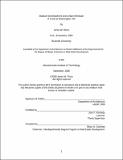| dc.contributor.advisor | John F. Kennedy. | en_US |
| dc.contributor.author | Rizzo, James W. (James Watson) | en_US |
| dc.contributor.other | Massachusetts Institute of Technology. Center for Real Estate. | en_US |
| dc.coverage.spatial | n-us-dc | en_US |
| dc.date.accessioned | 2010-09-22T15:58:18Z | |
| dc.date.available | 2010-09-22T15:58:18Z | |
| dc.date.copyright | 2008 | en_US |
| dc.date.issued | 2008 | en_US |
| dc.identifier.uri | http://hdl.handle.net/1721.1/58643 | |
| dc.description | Thesis (S.M. in Real Estate Development)--Massachusetts Institute of Technology, Dept. of Architecture, Center for Real Estate, 2008. | en_US |
| dc.description | This electronic version was submitted by the student author. The certified thesis is available in the Institute Archives and Special Collections. | en_US |
| dc.description | Includes bibliographical references (leaf 81). | en_US |
| dc.description.abstract | This thesis investigates the factors, related to urban stadium development, that act as a catalyst for subsequent local urban renewal. Over the recent decades there has been substantial debate related to stadium or arena development. "The stadium debate intersects with cultural studies, economics, law, urban studies, civic planning, sports administration, mass communications, and sociology."' The center of this debate is over the economic and social "net benefit" to a city that undertakes a stadium development. Many argue that the economic and social costs created by urban stadium development outweigh the public good, especially in the case of publicly funded or subsidized stadiums. This thesis concentrates on the renewal of the surrounding real estate markets rather than broader economic renewal. When this thesis refers to "urban renewal" it is meant in the context of the renewal of the physical infrastructure and real property. The thesis examines the range of costs and benefits resulting from stadium induced urban real estate renewal. The benefits analyzed are derived from the changes in the local real estate markets that may be connected to the arena or stadium construction. The subject case study illustrates some of the broader economic benefits related to urban real estate renewal. Washington, DC provides a recent example of urban arena development that led to significant local investment in the development of the surrounding area. Construction of the Verizon Center led to development of residential, office, and retail product in the immediate area. The case study explores the factors (specific to the site, team owners, local developers, and city officials) that create a fertile environment for urban real estate renewal. | en_US |
| dc.description.abstract | (cont.) It also ascertains, by way of interviews and public record, the concerns of these parties while making the critical decisions that can spark this type of urban rebirth. Using the Verizon Center case study, this thesis examines the factors that had a positive impact on urban renewal. | en_US |
| dc.description.statementofresponsibility | by James W. Rizzo. | en_US |
| dc.format.extent | 88 leaves | en_US |
| dc.language.iso | eng | en_US |
| dc.publisher | Massachusetts Institute of Technology | en_US |
| dc.rights | M.I.T. theses are protected by
copyright. They may be viewed from this source for any purpose, but
reproduction or distribution in any format is prohibited without written
permission. See provided URL for inquiries about permission. | en_US |
| dc.rights.uri | http://dspace.mit.edu/handle/1721.1/7582 | en_US |
| dc.subject | Architecture. | en_US |
| dc.subject | Center for Real Estate. | en_US |
| dc.title | Stadium development and urban renewal : a look at Washington, DC | en_US |
| dc.type | Thesis | en_US |
| dc.description.degree | S.M.in Real Estate Development | en_US |
| dc.contributor.department | Massachusetts Institute of Technology. Center for Real Estate | en_US |
| dc.contributor.department | Massachusetts Institute of Technology. Department of Architecture | |
| dc.identifier.oclc | 315857329 | en_US |
